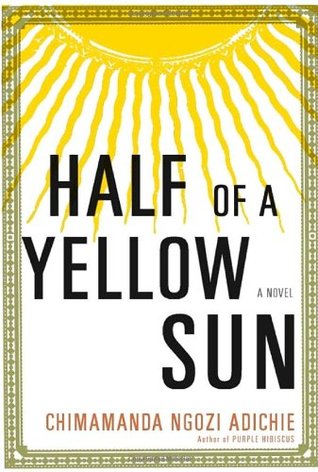Our book group choice for September 2021 is Half of a Yellow Sun by Chimamanda Ngozi Adichie. A masterly, haunting novel, Half of a Yellow Sun recreates a seminal moment in modern African history.
It chronicles Biafra’s impassioned struggle to establish an independent republic in Nigeria, and the chilling violence that followed. Published in 2006, Half of A Yellow Sun garnered numerous accolades and was awarded the Orange Prize for Fiction in 2007.
With astonishing empathy and the effortless grace of a natural storyteller, Chimamanda Ngozi Adichie weaves together the lives of three characters swept up in the turbulence of the decade.ds
Thirteen-year-old Ugwu is employed as a houseboy for a university professor full of revolutionary zeal. Olanna is the professor’s beautiful mistress, who has abandoned her life of privilege in Lagos for a dusty university town and the charisma of her new lover. And Richard is a shy young Englishman in thrall to Olanna’s twin sister, an enigmatic figure who refuses to belong to anyone. As Nigerian troops advance and they must run for their lives, their ideals are severely tested, as are their loyalties to one another.
Discussion Questions for Half of a Yellow Sun
- Did you finish the book? Was it an enjoyable read?
- Did you have previous knowledge of the Biafran War/Nigerian Civil War? Did you feel that background knowledge was necessary to understand the plot? Are you any the wiser now?
- Ugwu is a young boy at the start of the book. He goes through a few upheavals, starting with the move from the village to life on an academic campus. How does he cope?
- Was his viewpoint necessary to the story? What did it add?
- The relationship between the twins, Olanna and Kainene was already drifting at the start of the book. How did their relationship develop through the various challenges they faced.
- The sisters’ relationship is further damaged when Olanna seduces Richard. Why does Olanna do this? Is she is taking revenge on Odenigbo for his infidelity?
- How did Odenigbo develop during the course of the book? Why did the death of his mother affect him so much?
- What did you think of the portrayal of white people/westerners in the book? e.g. Richard, Susan, the western journalists. How did they reflect old v new Africa?
- How did you find the structure of the novel – i.e. the early sixties/late sixties sections. Would it have worked just as well in chronological order?
- Did the book feel like it was taking a particular political stance, or giving an impartial view?
- What, if anything, did the book say about the empowerment of women?
- Was the civil war a ‘leveller’ in terms of class mobility and opportunity? (Think of Olanna’s parents, black marketeers, educational opportunites)
- Several excerpts from a book called The World Was Silent When We Died are inserted at various points of the book. What did you make of this and what did it add to the narrative?
- How does being witnesses to violent death change people in the story—Olanna, Kainene, Odenigbo, Ugwu? How does Adichie handle descriptions of scenes of violence, death, and famine?
- Kainene’s disappearance was left unresolved at the end of the book – what do you think might have happened to her?
- The book won many awards including the Orange prize for fiction in 2007. Do you think the honours were deserved?
- To whom would you recommend this book? And for what reasons would you do so?
Individual Ratings
EmmaJ's Rating 




Baljit's Rating 




Jo's Rating 




DKB's Rating 




Sue's Rating 




Catherine's Rating 





